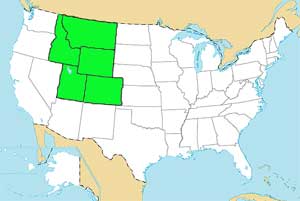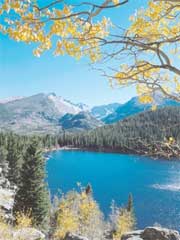 The Mountain States (also known as the Mountain West) form one of the geographic divisions of the United States officially recognized by the United States Census Bureau. The division consists of eight states: Arizona, Colorado, Idaho, Montana, Nevada, New Mexico, Utah, and Wyoming. Several of these states are sometimes seen as parts of other regions, while Colorado, Idaho, Montana, Utah, and Wyoming are considered the standards of the Mountain State region (as well as for this article). The word "Mountain" refers to the Rocky Mountains, which run north-south throughout the division, and also to Mountain Standard Time. The Mountain States (also known as the Mountain West) form one of the geographic divisions of the United States officially recognized by the United States Census Bureau. The division consists of eight states: Arizona, Colorado, Idaho, Montana, Nevada, New Mexico, Utah, and Wyoming. Several of these states are sometimes seen as parts of other regions, while Colorado, Idaho, Montana, Utah, and Wyoming are considered the standards of the Mountain State region (as well as for this article). The word "Mountain" refers to the Rocky Mountains, which run north-south throughout the division, and also to Mountain Standard Time.

Since the late 1960s, the Mountain States have moved to challenge the Southern States for the distinction of being the nation's most politically Republican geographical entity; a large part of this trend has been caused by the arrival of individuals from the more Democratic Pacific States, especially California, from that time onward.

 The brand of conservatism espoused by some in the region has at times manifested itself in extreme ways as several Patriot/Militia groups with Neo-Nazi tendencies have established their headquarters in parts of Idaho and Montana. However, there is a clear distinction from the American Bible Belt, with the philosophy of Mountain States citizens often being much more libertarian and based upon individualism. Some argue its foundation is the Wild West and solitary cowboy traditions. The brand of conservatism espoused by some in the region has at times manifested itself in extreme ways as several Patriot/Militia groups with Neo-Nazi tendencies have established their headquarters in parts of Idaho and Montana. However, there is a clear distinction from the American Bible Belt, with the philosophy of Mountain States citizens often being much more libertarian and based upon individualism. Some argue its foundation is the Wild West and solitary cowboy traditions.
The Republican monopoly on the Mountain States eased a bit in 2004. Democrats gained control of the state legislatures in Montana and Colorado, won back a House and Senate seat in Colorado and the governorship in Montana. In Utah, Democrats came within ten percentage points of the governorship and won the state's second top ranking post as the Mayor of Salt Lake County (roughly a million residents). John Kerry, although he didn't carry any of the Mountain States, gave a stronger showing than Al Gore in Colorado.
Howard Dean has argued that Republicans performed more poorly than expected during the 2004 elections due to a libertarian backlash against activist conservatism. Democrats have felt the Mountain States are a place where their party can grow in the future. Democratic Party growth is also helped by the region's increasing Hispanic population, already a significant political factor in several of the Mountain States.
|
